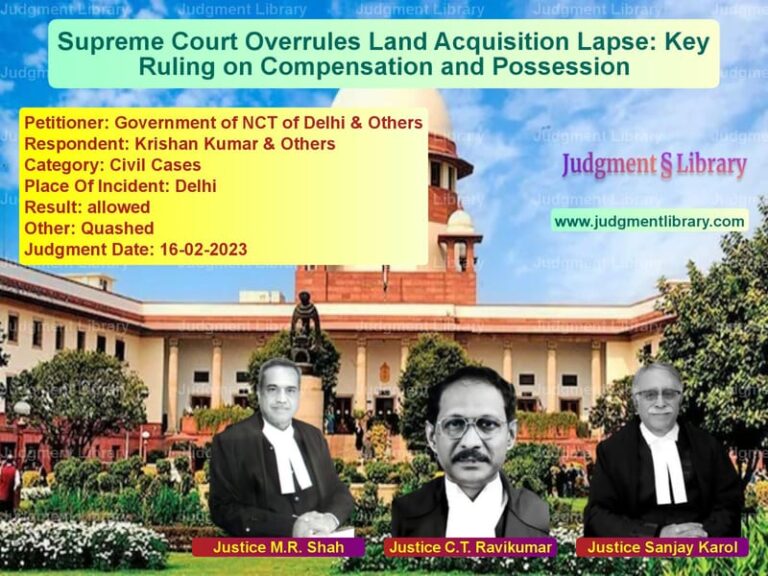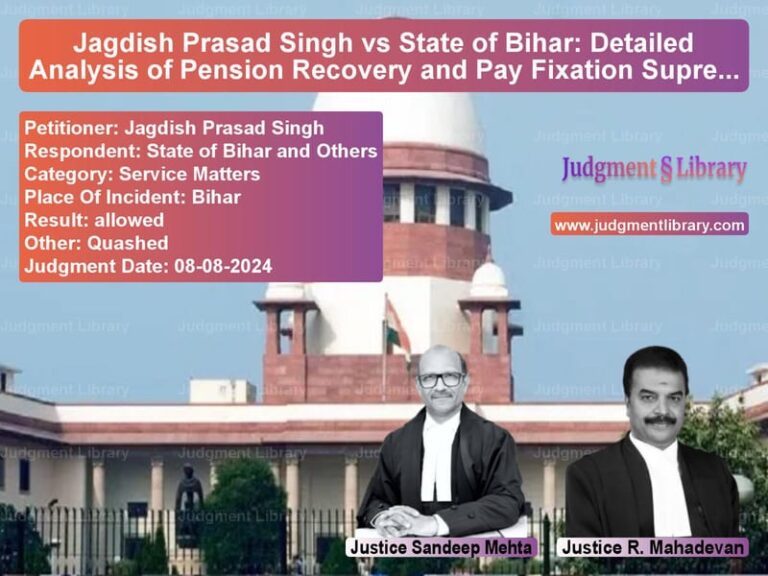Supreme Court Upholds Auction Sale: Legal Ownership of Property Affirmed
The Supreme Court of India, in Palaniammal and Others v. Kamalakannan and Others, ruled on a long-standing property dispute concerning the validity of an auction sale held in 1955. The Court upheld the High Court’s decision, affirming the auction purchaser’s title and dismissing claims that the property was held in trust for the plaintiffs. The judgment clarifies legal principles related to auction sales, adverse possession, and the burden of proof in property disputes.
Background of the Case
The plaintiffs, legal heirs of Govindasamy, filed a suit in 1988 seeking to set aside the auction judgment of 1955 in favor of Govindan, father of the defendants. They sought possession of the suit property and mesne profits for three years. The trial court ruled in their favor, declaring that Govindan was only an ostensible owner who purchased the property on behalf of Govindasamy. The High Court, in a first appeal by the defendants, reversed the decision, holding that Govindan was the lawful purchaser.
Petitioner’s Arguments
The appellants, who were the legal heirs of Govindasamy, presented the following key arguments:
- “The auction sale was invalid as the defendant failed to pay the auction price along with 7% interest within the stipulated six-month period.”
- “The auction was initially knocked down in favor of Joseph Antoine, not Govindan, and the transfer to Govindan was improper.”
- “Govindan was a mere name-lender; Govindasamy had funded the auction purchase to prevent third-party claims on the property.”
- “There was a fiduciary relationship between Govindasamy and Govindan, which required the latter to return the property to the former’s legal heirs.”
- “The defendants failed to establish adverse possession since their occupation was neither hostile nor uninterrupted.”
Respondent’s Arguments
The defendants, legal heirs of Govindan, defended their ownership with the following contentions:
- “The plaintiffs filed the suit in 1987—over 30 years after the auction—making it hopelessly time-barred.”
- “Govindasamy was heavily indebted, making it improbable that he funded the purchase.”
- “A valid sale certificate was issued in favor of Govindan in 1960, and subsequent documents, including patta records, electricity bills, and tax receipts, confirm his ownership.”
- “Govindasamy did not contest the auction during his lifetime; his legal heirs cannot challenge it now.”
Supreme Court’s Observations
The Supreme Court analyzed the facts and legal principles surrounding auction sales and burden of proof. The Court observed:
“The suit was filed over 30 years after the auction sale and is clearly time-barred under limitation law. The plaintiffs’ failure to act within a reasonable period weakens their claim.”
Regarding the plaintiffs’ claim that Govindan purchased the property on Govindasamy’s behalf, the Court noted:
“The plaintiffs failed to produce any evidence to show that Govindasamy had provided funds for the auction purchase. Mere assertions without documentary proof are insufficient.”
The Court also addressed the claim of adverse possession:
“For adverse possession to be valid, possession must be open, continuous, and hostile to the interests of the actual owner. The defendants’ possession was lawful as title was acquired through auction.”
Final Judgment
The Supreme Court dismissed the appeal, affirming the High Court’s decision that Govindan was the lawful owner of the property. The Court emphasized that auction sales must be challenged within a reasonable timeframe and that mere allegations of a trust arrangement are not sufficient to defeat a valid title.
Key Takeaways
- Auction sales must be challenged promptly, or they become final under limitation laws.
- The burden of proof lies on the claimant alleging a trust arrangement or name-lending in property transactions.
- Possession following a valid auction sale does not constitute adverse possession.
- Documentary evidence, such as sale certificates and revenue records, is crucial in establishing ownership.
Conclusion
The Supreme Court’s decision reinforces legal certainty in auction sales and protects bona fide purchasers. The ruling highlights the importance of timely legal action and documentary evidence in property disputes. By dismissing the appeal, the Court ensures that lawful auction purchasers are not deprived of their ownership due to unsubstantiated claims made decades later.
Petitioner Name: Palaniammal and Others.Respondent Name: Kamalakannan and Others.Judgment By: Justice Ashok Bhushan, Justice Navin Sinha.Place Of Incident: Tamil Nadu.Judgment Date: 17-03-2020.
Don’t miss out on the full details! Download the complete judgment in PDF format below and gain valuable insights instantly!
Download Judgment: Palaniammal and Othe vs Kamalakannan and Oth Supreme Court of India Judgment Dated 17-03-2020.pdf
Direct Downlaod Judgment: Direct downlaod this Judgment
See all petitions in Property Disputes
See all petitions in Contract Disputes
See all petitions in Debt Recovery
See all petitions in Judgment by Ashok Bhushan
See all petitions in Judgment by Navin Sinha
See all petitions in dismissed
See all petitions in supreme court of India judgments March 2020
See all petitions in 2020 judgments
See all posts in Civil Cases Category
See all allowed petitions in Civil Cases Category
See all Dismissed petitions in Civil Cases Category
See all partially allowed petitions in Civil Cases Category







